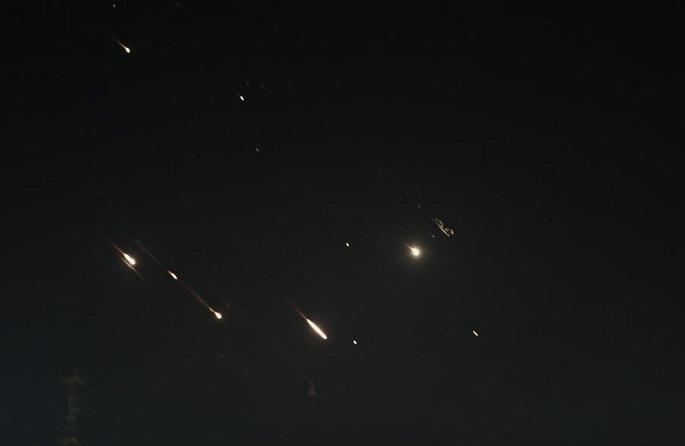Israel says 99% of Iran's launches intercepted
Published : 14 Apr 2024, 20:47
The Israeli military said on Sunday that it intercepted about 99 percent of more than 300 missiles and drones Iran launched late Saturday in its first direct attack against Israel, reported Xinhua.
Booms, the noise of heavy fighter jet traffic, and air raid sirens were heard across Israel as the Iranian retaliatory assault, seeking vengeance for the killing of seven Iranian officials, including two veteran commanders, in Damascus on April 1, began around midnight.
"Together with our partners, the Americans and others, we managed to block the attack with very little damage caused," said Israeli Defense Minister Yoav Gallant, describing the outcome as "an impressive achievement."
Gallant noted that the incident has not been over, and the Israeli Air Force remains on high alert.
In a press briefing, Israel Defense Forces (IDF) Spokesman Daniel Hagari said that Iran had launched about 170 drones, more than 30 cruise missiles, and over 120 ballistic missiles.
Hagari said the IDF's Arrow anti-missile system successfully intercepted most of the ballistic missiles outside the atmosphere.
According to the spokesman, "a few" ballistic missiles did hit Israel, causing minor damage to the Nevatim Airbase in the Negev Desert. The drones and cruise missiles did not hit Israeli territory.
Israel's Magen David Adom rescue service reported that a seven-year-old girl in a Bedouin village suffered severe injuries, apparently from a missile strike. However, it added that the circumstances of her injury were still under investigation by the police.
At 7:00 a.m. local time (0400 GMT), the Israeli airspace was opened after being closed for more than six hours, the Israeli Airports Authority said.
Jordanian state television reported that Jordan's airspace was also reopened in the morning after the kingdom participated in intercepting the drones overnight.
The closure of airspace in Lebanon and Iraq has also been lifted.
Footage released by the military showed an F-35 warplane returning to the Nevatim Airbase after participating in the defense operation. Israel's Channel 12 TV news broadcast footage of the country's international Ben Gurion Airport resuming operations, suggesting it was an indication that the nation is returning to normalcy.
"We intercepted. We blocked. Together we will win," Israeli Prime Minister Benjamin Netanyahu wrote on social media platform X on Sunday morning.
Iran's official news agency, IRNA, reported that Commander of Iran's Islamic Revolution Guards Corps Hossein Salami warned on Sunday that any reaction from Israel would be met with a much stronger response.
Israel might not have the U.S. support for a counterattack. Overnight, Netanyahu and U.S. President Joe Biden talked over the phone, according to Netanyahu's office.
Israel's Walla news site reported that Biden told Netanyahu that the U.S. would not support an Israeli counterattack against Iran.
Hagari said that "a wide-scale attack by Iran is a severe and dangerous escalation." However, asked whether Israel would retaliate, he said only that the army "does and will do whatever is required to protect the security of Israel."
Hezbollah, Iran's key ally, which has been engaging in conflict with Israel since the start of the Gaza war, claimed early Sunday that it had targeted an Israeli military base with rockets. In response, the Israeli military stated that its fighter jets conducted airstrikes on multiple structures and a compound belonging to Hezbollah's Radwan Forces in southern Lebanon.
U.S. Defense Secretary Lloyd Austin said in a statement that U.S. forces "intercepted dozens of missiles and UAVs (unmanned aerial vehicles) en route to Israel, launched from Iran, Iraq, Syria and Yemen."
Several Western countries, including France and Britain, condemned the Iranian retaliation, with the United Nations Secretary-General Antonio Guterres slamming it a "serious escalation."


